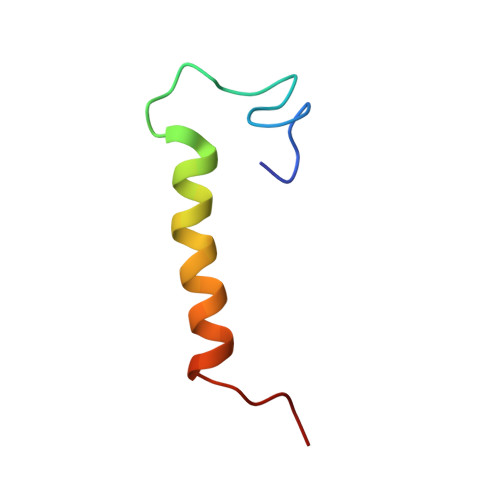Evolutionarily Conserved Binding of Translationally Controlled Tumor Protein to Eukaryotic Elongation Factor 1B.
Wu, H., Gong, W., Yao, X., Wang, J., Perrett, S., Feng, Y.(2015) J Biological Chem 290: 8694-8710
- PubMed: 25635048
- DOI: https://doi.org/10.1074/jbc.M114.628594
- Primary Citation of Related Structures:
2MVM, 2MVN - PubMed Abstract:
Translationally controlled tumor protein (TCTP) is an abundant protein that is highly conserved in eukaryotes. However, its primary function is still not clear. Human TCTP interacts with the metazoan-specific eukaryotic elongation factor 1Bδ (eEF1Bδ) and inhibits its guanine nucleotide exchange factor (GEF) activity, but the structural mechanism remains unknown. The interaction between TCTP and eEF1Bδ was investigated by NMR titration, structure determination, paramagnetic relaxation enhancement, site-directed mutagenesis, isothermal titration calorimetry, and HADDOCK docking. We first demonstrated that the catalytic GEF domain of eEF1Bδ is not responsible for binding to TCTP but rather a previously unnoticed central acidic region (CAR) domain in eEF1Bδ. The mutagenesis data and the structural model of the TCTP-eEF1Bδ CAR domain complex revealed the key binding residues. These residues are highly conserved in eukaryotic TCTPs and in eEF1B GEFs, including the eukaryotically conserved eEF1Bα, implying the interaction may be conserved in all eukaryotes. Interactions were confirmed between TCTP and the eEF1Bα CAR domain for human, fission yeast, and unicellular photosynthetic microalgal proteins, suggesting that involvement in protein translation through the conserved interaction with eEF1B represents a primary function of TCTP.
- From the National Laboratory of Biomacromolecules, Institute of Biophysics, Chinese Academy of Sciences, Beijing 100101, the University of Chinese Academy of Sciences, Beijing 100049, China.
Organizational Affiliation:
















